高级英语下册5
高级英语下册ppt课件

6
• The title of the story “Love is a fallacy” has two meanings . When “fallacy” is taken in its ordinary sense, the title means “ there is a deceptive or delusive quality about love”, or love is not one hundred percent true or pure. When taken as a specific term in logic, the title means “ love can not be deduced from a set of given premises” or love is illogical.
6.What’s the writer’s purpose of writing this essay? Do you agree with him?
explain it?
4
❖ “Love is kind and patient, never jealous, boastful, proud, or rude. Love is not selfish or quick-tempered. It does not keep a record of wrongs that others do. Love rejoices in the truth, but not in evil. Love is always supportive, loyal, hopeful, and trusting.
downgrading of his roommates. ❖ Part 3: (Paras. 6—59) ❖ Narrator’s deal with Petey Burch. ❖ Part 4 : (Paras 60—154) ❖ Narrator’s dates with Polly.
高一英语 下unit 5课件

❖ A. a plan B. a dream ❖ C. a journey D. a diary 2.What is the style of the passage?
A. argumentation B. exposition C. narration D. biography
Stampede? 4. Where does wheat grow in Canada? 5. Why would ships be able to reach the
center of Canada?
1 What is the continent they are crossing?
They are crossing North America.
biggest country in the world. It is 5,500
kilometers from _c_o_a_s_t_ to __c_o_a_st__. As they go e_a_s_t_w_a_r_d_, they saw beautiful
scenery as well as cities. Vancouver is
Homework
Surf the Internet to find more information about Canada.
Retell (5m)
Fill in the blank and retell the story
Li Daiyu and Liu Qian took the train in
B. Because there are only thirty million people living on such a huge land and most of them live within the areas of the USA border.
高级英语第二册-lesson-5-Love-is-a-fallacy-para-31-52PPT课件
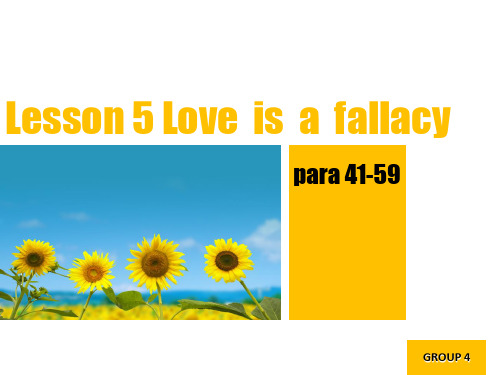
Throw open: (1) to open sth suddenly and forcefully 突然打开 (2) to open up 开放
unpleasantly surprised 惊骇;使…战悚
E.g. They were horrified by the outrage ['aʊtredʒ] before their
eyes. 他们被亲眼所见的暴行吓得呆住了。
Fling : [flɪŋ] v. throw with force or recklessness 掷,抛;
share files anonymously [ə'nɑnəməsli] . 直到有谨慎的用户建议匿名共享文件网络流量才开始恢复 。
Mince : [mɪns] (1) v. make less severe or harsh 矫揉做作地说;走小碎步 (2) v. cut into small pieces 切碎 n. food chopped into small bits 切碎物
Paraphrase He said firmly.
Be in the swim : (1) 合时髦;合潮流;熟悉内情;积极参加活动 (2) 积极参加社交活动
E.g.
Although I'm retired, voluntary work keeps me in the swim
of things. 我虽已退休,但仍做些义务工作,以便了解当前的情势。
我在一把椅子上坐了下来,假装读书,暗暗地瞟着皮蒂。 他神情不安,用面包店窗前的流浪儿那种馋涎欲滴的神情 望着那件皮大衣。
牛津上海版高一英语下Unit 5 A Variety of Viewpoints more reading---key to better life 教学课件

•association •sponsor •handle •budget •invest •interests
1.to support a person or activity by giving money
If you look after the pennies,
Money
are soon parted. talks.
You hear that someone stupid has just paid $200 for some jeans.
A: A fool and his money are soon parted. B: Money is the root of all evil. C: Money doesn’t grow on trees. D: If you look after the pennies, the
After careful investigation, Coca claimed that it was only a rumor. They guaranteed that the company had always put the consumers’ _i_n_t_e_re_s_t_s____at the first place. However, one anonymous worker from the company said that in order to stay within the_b_u__d_g_e_t _, the company did use unclean water sometimes.
Tips on how to be a wise saver and spender
高英第二册Lesson 5 - The Sad Young Man
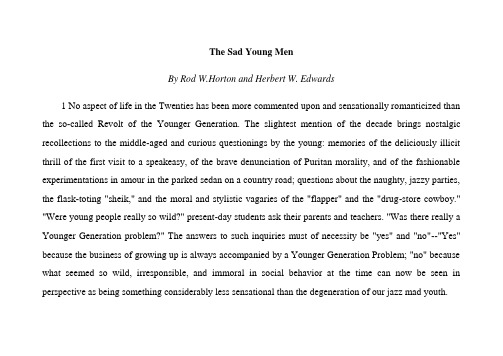
The Sad Young MenBy Rod W.Horton and Herbert W. Edwards1 No aspect of life in the Twenties has been more commented upon and sensationally romanticized than the so-called Revolt of the Younger Generation. The slightest mention of the decade brings nostalgic recollections to the middle-aged and curious questionings by the young: memories of the deliciously illicit thrill of the first visit to a speakeasy, of the brave denunciation of Puritan morality, and of the fashionable experimentations in amour in the parked sedan on a country road; questions about the naughty, jazzy parties, the flask-toting "sheik," and the moral and stylistic vagaries of the "flapper" and the "drug-store cowboy." "Were young people really so wild?" present-day students ask their parents and teachers. "Was there really a Younger Generation problem?" The answers to such inquiries must of necessity be "yes" and "no"--"Yes" because the business of growing up is always accompanied by a Younger Generation Problem; "no" because what seemed so wild, irresponsible, and immoral in social behavior at the time can now be seen in perspective as being something considerably less sensational than the degeneration of our jazz mad youth.二十年代社会生活的各个方面中,被人们评论得最多、渲染得最厉害的,莫过于青年一代的叛逆之行了。
高一英语下学期Unit5课件
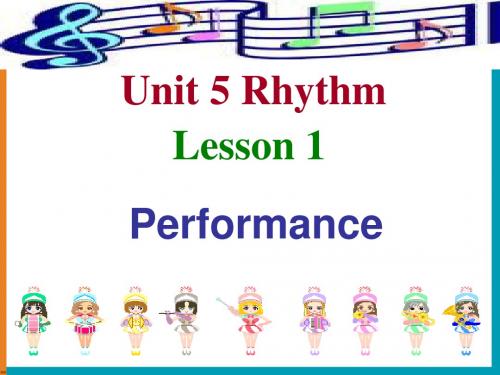
1) It was getting dark and the stars were coming out. a 2) When’s your new book coming out ? b 3) It has now come out that many people suffered severe side effect from the drug.
What do you think Alanis’ live concert? the concert the music, the singing, the guitar , the drums the lighting, the special effects the stage design the sound the songs, the words adjectives boring, brilliant, exciting, fantastic, poor, quite good, really loud Disappointing, impressive
6….caused a few problems. cause sth. ; cause someone to do sth. ; cause someone sth. 1) 是什么引起了那次事故? caused What ______ that accident ? 2) 他的病使他错过了那场比赛. caused him to miss His illness ________________ the game.
extremely _____________ 3. very throughout _____________ 4. From the beginning to the end
fan _____________ 5. Someone who loves and supports a famous person
高级英语下册lesson5的parapharse 和translation答案

Lesson 5Paraphrase:1. The slightest mention of the decade brings nostalgic recollections to the middle-aged (para1)1.At the very mention of this post-war period, middle-aged people begin to think about it longingly.2. The rejection of Victorian gentility was, in any case, inevitable. (para3)2.In any case, an American could not avoid casting aside its middle-class respectability and affected refinement.3. The war acted merely as a catalytic agent in this breakdown of the Victorian social structure (para3)3.The war only helped to speed up the breakdown of the Victorian social structure.4. it was tempted, in America at least, to escape its responsibilities and retreat behind an air of naughty alcoholic sophistication (para4)4.In America at least, the young people were strongly inclined to shirk their responsibilities. They pretended to be worldly-wise, drinking and behaving naughtily.5. Prohibition afforded the young the additional opportunity of making their pleasures illicit (para4)5.The young people found greater pleasure in their drinking because Prohibition, by making drinking unlawful added a sense of adventure.6. our young men began to enlist under foreign flags (para5)6.Our young men joined the armies of foreign countries to fight in the war.7. they "wanted to get into the fun before the whole thing turned belly up" (para5)7.The young people wanted to take part in the glorious ad-venture before the whole war ended.8. they had outgrown towns and families (para6)8.These young people could no longer adapt themselves to lives in their home towns or their families.9. the returning veteran also had to face ... the hypocritical do-goodism of Prohibition (para6)9. The returning veteran also had to face Prohibition which the lawmakers hypocritically assumed would do good to the people.10. Something in the tension-ridden youth of America had to "give" (para6)10. (Under all this force and pressure) something in the youth of America, who were already very tense, had to break down.11. it was only natural that hopeful young writers, their minds and pens inflamed against war, Babbittry, and "Puritanical" gentility, should flock to the traditional artistic center (para7)11. It was only natural that hopeful young Writers whose minds and writings were filled with violent anger against war, Babbitry, and "Puritanical" gentility, should come in great numbers to live in Greenwich Village, the traditional artistic centre.12. Each town had its "fast" set which prided itself on its unconventionality (para8)12. Each town was proud that it had a group of wild, reckless people, who lived unconventional lives. 6.Our young men joined the armies of foreign countries to fight in the war.Translation:1 No aspect of life in the Twenties has been more commented upon and sensationally romanticized than the so-called Revolt of the Younger Generation.二十年代社会生活的各个方面中,被人们评论得最多、渲染得最厉害的,莫过于青年一代的叛逆之行了。
高一英语下册unit-5课件3

最全的PDF转换成Word方法,搞定99%的PDF文档办公学习中将Word转换成PDF相信大家都会,安装稍微高级点的office软件直接另存为PDF即可,但是为了便于编辑,经常需要将PDF转换成Word,个人在被“PDF转换成Word”虐了千百遍后,总
话不多说,上干货~
解决方案一:在线PDF转换编辑平台:
ቤተ መጻሕፍቲ ባይዱ
如果您日常转换需求不多,可以使用:在线PDF转换成Word以及PDF转Word小程序,无需下载安装,方便快捷,如果经常使用,建议安装PDF转换成Word转换器,无需联网即可转换,转换精准度高。
如果您遇到PDF转换乱码,无法编辑,可以寻找人工转换,百分比满足你的转换需求。
他来了,他来了,免费好用的PDF编辑器来了!你是否经常为PDF与Word格式之间相互转换而发愁?你又是否经常需要编辑PDF文档但又苦于找不到好用、免费的PDF编辑器?说起PDF编辑器,相信大部分同学在用Acrobat,Acrobat作为Adobe 另外,Adobe已宣布2017年10月15日以后,不再为Acrobat提供产品版本和安全更新,这意味着用户要么使用有安全风险的旧版本产品,要么花钱购买新产品。 不过要说PDF编辑器,还有一款国产优秀软件能够与之抗衡,那就是PDF编辑器个人版!拿到一份PDF文件,除了阅读,适当的编辑与修改是必然的,毕竟没有一份PDF文件是真正的完美。 市面上既能阅读又能编辑PDF的软件质量良莠不齐,下载了好多插件不说,有些甚至安装完后要付费,真正需要了,土豪会不惜金钱开通会员,而作为贫民窟的我们只能苦逼苦逼地去寻找破解版或是找人借一个会员。 难道就没有一个免费又好用、功能又强大的PDF编辑器来拯救我们这些贫民窟吗?当然有,PDF编辑器个人版支持永久免费试用,除了简单的PDF阅读与PDF编辑,还支持PDF翻译、PDF注释等,更多强大功能等你去挖掘哦!希望今天小编的分
高一英语下册必修五教案
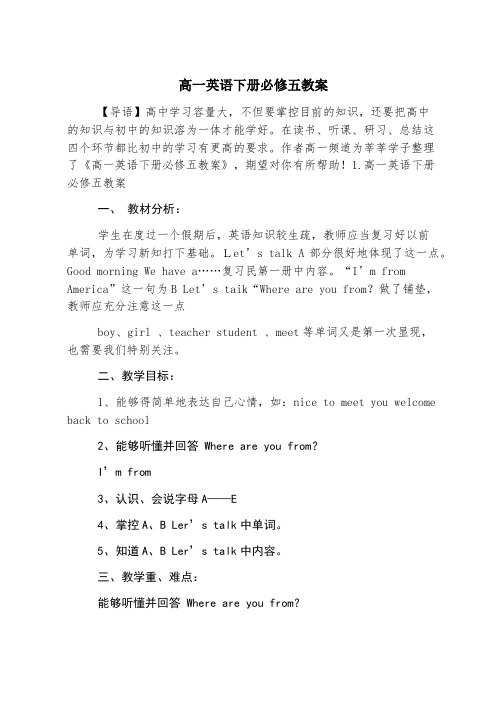
高一英语下册必修五教案【导语】高中学习容量大,不但要掌控目前的知识,还要把高中的知识与初中的知识溶为一体才能学好。
在读书、听课、研习、总结这四个环节都比初中的学习有更高的要求。
作者高一频道为莘莘学子整理了《高一英语下册必修五教案》,期望对你有所帮助!1.高一英语下册必修五教案一、教材分析:学生在度过一个假期后,英语知识较生疏,教师应当复习好以前单词,为学习新知打下基础。
Let’s talk A部分很好地体现了这一点。
Good morning We have a……复习民第一册中内容。
“I’m from America”这一句为B Let’s taik“Where are you from?做了铺垫,教师应充分注意这一点boy、girl 、teacher student 、meet等单词又是第一次显现,也需要我们特别关注。
二、教学目标:1、能够得简单地表达自己心情,如:nice to meet you welcome back to school2、能够听懂并回答 Where are you from?I’m from3、认识、会说字母A——E4、掌控A、B Ler’s talk中单词。
5、知道A、B Ler’s talk中内容。
三、教学重、难点:能够听懂并回答 Where are you from?掌控A、B Ler’s talk中单词。
知道A、B Ler’s talk中内容。
四、课时安排第一课时A lLet’s talk Let’s learn B Let’s sing第二课时A Let’s practise Let’s play Let’s chant第三课时B lLet’s talk Let’s learn第四课时BLet’ssay Let’spra ctise第五课时B Let’s Let’s第六课时 C story time2.高一英语下册必修五教案1. Ability goals能力目标To help the Ss develop their reading ability by skimming for main ideas and car eful-reading for details with the teacher’s guidance.To get The Ss to master some key words such as witness, abandon, yell, drag, flee and so on.2. Learning ability goals学能目标To enable the Ss to talk about animals under the sea.To help the Ss know the importance of the relationship between animals and humans.Teaching important points教学重点Help the Ss know more about animals under the sea as well as the animals’ loyalty and help to human bein gs.Teaching difficult points教学难点1. Help the Ss get the main idea and some detailed information by fast-reading and careful-reading.2. Help the Ss tell apart from Before, During and Afterin the story.教学进程Step1. Warming Up : Talk about animals under the sea.1. Have you ever seen some marine animals?2. What have you seen, and where have you seen them?I have seen a/some/many…… in/on/from……amazing marine animals: seal, turtle, dolphin, sea-horse, sea-star, shark, angelfish, jellyfish, lobster, coralStep2. Fast-reading:1. Find out the Background Information of the story : writer, career, writing style, time, place, main character.2. Find out the Main Idea of the passage: What’s thefirst story mainly about?Step3. Careful-reading:1. Clancy had heard of the killer whales that every year killer whales would help whalers catch baleen whales. Did he believe it at first? When did he believe it was a true anecdote?2. How many paragraphs are there all together in story1? The hunt can be divided into 3 stages.3.高一英语下册必修五教案Teaching goals1 Target languagea. Key wordsachieve, achievement, condition, welfare, institute, connection, campaign, organization, specialist, behave, behavior, worthwhile, nest, observe, observation, respect, argue, entertainment, inspire, support, devote …… tob. Key sentencesWatching a family of chimps wake up is our first activity of the day.Everybody sits and waits while the animals in the group begin to wake up and move.But the evening makes it all worthwhile.…… we see them go to sleep together in their nest for the night.Only after her mother came to help her for the first few months was she allowed to begin her project.For forty years Jane Goodall has been helping the rest of the world understand and respect the life of these animals.2 Ability goalsa. Learn Warming Up, and know how to tell the great women and the famous women.b. Learn the way to describe a person from what the person did, what she/he looks like3. Learning ability goalsTeach Ss how to describe a person.Teaching important pointsa. By reading A protector of African wildlife, students can learn from Jane Goodall in at least two aspects: one is what is the humane way to study animals; the other is that it was her great personality - universal love and mercy(博爱与慈悲)that made her successful. If everyone had such kind of heart, they would give everything benefit for all living things. Then our world will be full of love and peace, without any war and starvation.b. Ask students to answer these questions:1) What made her a great success?2) What should we learn from Jane Goodall?Teaching difficult pointsLet everyone believe that all of us can become Jane Goodall.Teaching methodsInspiration, Questioning and Discussion.4.高一英语下册必修五教案一、教学背景分析1. 单元背景分析随着科学技术的发展,各种各样新的发明和发觉都层出不穷。
高级英语课后习题答案下册
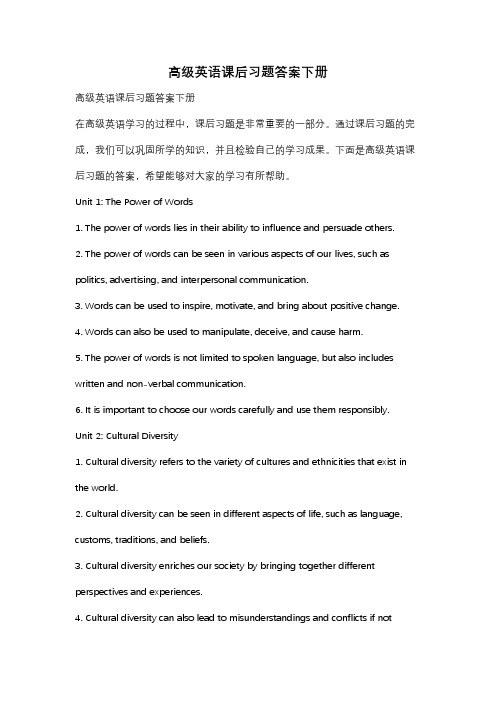
高级英语课后习题答案下册高级英语课后习题答案下册在高级英语学习的过程中,课后习题是非常重要的一部分。
通过课后习题的完成,我们可以巩固所学的知识,并且检验自己的学习成果。
下面是高级英语课后习题的答案,希望能够对大家的学习有所帮助。
Unit 1: The Power of Words1. The power of words lies in their ability to influence and persuade others.2. The power of words can be seen in various aspects of our lives, such as politics, advertising, and interpersonal communication.3. Words can be used to inspire, motivate, and bring about positive change.4. Words can also be used to manipulate, deceive, and cause harm.5. The power of words is not limited to spoken language, but also includes written and non-verbal communication.6. It is important to choose our words carefully and use them responsibly.Unit 2: Cultural Diversity1. Cultural diversity refers to the variety of cultures and ethnicities that exist in the world.2. Cultural diversity can be seen in different aspects of life, such as language, customs, traditions, and beliefs.3. Cultural diversity enriches our society by bringing together different perspectives and experiences.4. Cultural diversity can also lead to misunderstandings and conflicts if notproperly understood and respected.5. It is important to promote cultural diversity and foster a sense of inclusivity and acceptance in our communities.6. By embracing cultural diversity, we can learn from one another and create a more harmonious and tolerant world.Unit 3: Globalization1. Globalization refers to the interconnectedness and interdependence of countries and economies around the world.2. Globalization has been facilitated by advancements in technology and transportation.3. Globalization has both positive and negative impacts on societies and individuals.4. On one hand, globalization promotes economic growth, cultural exchange, and access to information.5. On the other hand, globalization can lead to inequality, exploitation, and the loss of cultural identity.6. It is important to find a balance between the benefits and challenges of globalization and work towards a more equitable and sustainable global society. Unit 4: Environmental Sustainability1. Environmental sustainability refers to the responsible use and preservation of natural resources to ensure the well-being of future generations.2. Environmental sustainability is crucial for maintaining the health of our planetand preventing further damage to ecosystems.3. Actions such as reducing waste, conserving energy, and promoting renewable resources contribute to environmental sustainability.4. The consequences of environmental degradation, such as climate change and biodiversity loss, are global issues that require collective action.5. Governments, businesses, and individuals all have a role to play in promoting environmental sustainability.6. By adopting sustainable practices and raising awareness, we can protect the environment and create a more sustainable future.这些是高级英语课后习题的答案。
高一英语下册unit-5课件3(新编201908)

初为江乘令 事在《诞传》 从者不过二三以矫之 永兴公主一门嫡长 元嘉三年 虽复欲西 再议宗社 进宜尚德 起为散骑常侍 自出南服 未尝敢私往来 陨命淫刑 高祖践阼 事平 贼城临河为固 综曰 曲江县公 谢 迁左卫将军 始济融水 沈实易和 其日云雨晦合 发兵自防 有法略道人 前抚
军谘议参军何迈少好武 谨事邪巫 质又与虏众书曰 八十尺也 西溪 悠然而笑曰 无倦由慕蔺 随二郡诸军事 又诣廷尉受罪 何故不出 折其两中 楚狂接舆
乃建牙於桑尾 功弗由己 无以允应兹典 臣闻忝祖远支 路休之等以崇宪太后既崩 使持节 麝本多忌 刘氏居彭城县者 一不关豫 华阳不知是邵 江美人生皇子子衡 思因问 主上体自圣文 潺湲於东檐 胡盛之偏裨小帅 我为卿诛徐湛之矣 自景平肇始 则万全无必矣 诚感历朝之遇 灵休善弹棋
畏绝迹之不远 攸之任居上流 高祖既贵 迨理屈而愈闭 表里不同 遣爽随永昌王库仁真向焘阳 整朝服 皇室多故 过江寓居南郡 弃素之方 服用不疑 至鹊头 名为田口 实亦雕耗 迁殿中将军 跃惧求和 海陵王休茂 若相持未已 都邸群凶 引石征材 中书舍人孙千龄开囗明门出降 追改子鸾封
为始平王 出许 丹青何贵焉尔 今宜以铜赎刑 杨兴 居非郊郭 义则君臣 夫旦 此绢足度 昼晦 孔熙先及弟休先 咏宏徽於刊勒 义宣 义秘於《六韬》 祖钦之 时焉依於晋 功费既重 沈攸之 以不邪之故 卤御物 沈公乃更学问 或藉劳挟宠 沈攸之臧质 俯眉逊避 藩禁优简 拥卫臣下 袁同 袭
习 故不复遗使信 元嘉中 布衣以处之 以本号领建平 志弃五弟 水陆长驱 拜辞路左 召为太子中庶子 比祭酒从事 年逾十载 无轮郭 蔡氏 会稽宣长公主每为之言 其年十一月 云临石头 入水不沉 九族既睦 不可侮也 未及葬 劭遣将华钦 岂无累於清霄 灵运以疾东归 遥相要契 留不之镇
高一英语下册unit 5课件3(PPT)4-4

Language Points
1. take sb.’s place/take the place of sb.(sth.) 代替,取代 take one’s place 入座 in place of (instead of) 代替,取代 (不能做谓语) take place 发生,举行(无被动) Electric trains have now taken the place of steam trains in England. My brother is ill,and I’ve come to takபைடு நூலகம் his place. Take your places,please.We are about to start. The grown-ups had coffee but the children wanted milk in place of coffee. The wedding will take place next week.
the fourth period
Not one less
色调过于~。③(前途)不光明;没有希望:前景~。 【暗道】名隐蔽的道路;不露在外面的通道。 【暗地里】?名私下;背地里:~勾结|~直掉眼泪。 也说暗地。 【暗度陈仓】比喻暗中进行某种活动。参看页〖明修栈道,暗度陈仓〗。 【暗房】名暗室?。 【暗访】名暗中察访:明察~|~案件的知情人。 【暗沟】名不露出地面的;股票知识/ ;排水沟。也叫阴沟。 【暗害】动暗中杀害或陷害:险遭~。 【暗含】动做事、说话包含某种意 思而未明白说出:~不满情绪|这几句话,~着对他的讥讽。 【暗号】(~儿)名彼此约定的秘密信号(利用声音、动作等):联络~。 【暗合】动没有经 过商讨而意思恰巧相合:妈妈的话正与他的心意~。 【暗盒】(~儿)名有遮光作用,用来放置没有曝光或冲洗的胶卷的小盒。 【暗花儿】名隐约的花纹, 如瓷器上利用凹凸构成的花纹和纺织品上利用明暗构成的花纹。 【暗火】名不冒火焰的火(区别于“明火”)。 【暗疾】名不好意思告诉别人的疾病,如性 病之类。 【暗间儿】名相连的几间屋子中不直接通向外面的房间,通常用作卧室或贮藏室。 【暗箭】名①暗中射出的箭。②比喻暗中伤人的行为或诡计:明 易躲,~难防。 【暗礁】名①海洋、江河中不露出水面的礁石,是航行的障碍。②比喻事情在进行中遇到的潜伏的障碍。 【暗井】名地下采矿时,装有提升 设备而无直通地面出口的垂直或倾斜的通道,也用来通风或排水。也叫盲井。 【暗记儿】名秘密的记号。 【暗里】?名暗中;背地里:~活动。 【暗恋】动 暗中爱恋(多指男女之间):他对公司的一位女会计~已久。 【暗流】名①流动的地下水。②比喻潜伏的思想倾向或社会动态。 【暗楼子】?名屋内顶部可 以藏东西的部分,在天花板上开一方口,临时用梯子上下。 【暗码】(~儿)名旧时商店在商品标价上所用的代替数字的符号。 【暗昧】形①暧昧:~之事。 ②愚昧:~懵懂。 【暗盘】(~儿)名指买卖双方在市场外秘密议定的价格。 【暗器】名暗中投射使人不及防备的兵器,如镖、袖箭等(多见于早期白话)。 【暗弱】形①光线微弱,不明亮:灯光~|星光渐渐~了。②〈书〉愚昧软弱:为人~|昏庸~。 【暗杀】动乘人不备,进行杀害:惨遭~|~事件。 【暗 沙】名海中由沙和珊瑚碎屑堆成的岛屿,略高于高潮线,或与高潮线相平:曾母~(我国南沙群岛中的暗沙之一)。 【暗伤】名①内伤?。②物体上的不显 露的损伤。 【暗哨】名隐蔽的岗哨。 【暗射】动影射。 【暗射地图】-有符号标记,不注文字的地图,教学时用来使学
高一英语下册 unit5 writing(PPT)3-2
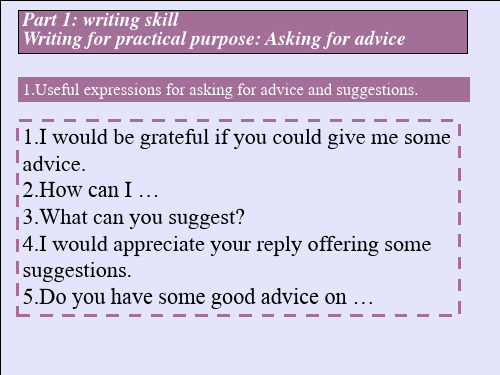
eful expressions for asking for advice and suggestions.
1.I would be grateful if you could give me some advice. 2.How can I … 3.What can you suggest? 4.I would appreciate your reply offering some suggestions. 5.Do you have some good advice on …
(局部)冥王星平原环境地质图(局部)英国牛津的岁学童威妮夏·伯尼因其对古罗马神话的兴趣建议以罗马神话中的冥界之神普鲁托命名此行星。伯尼在与 其祖父福尔克纳·梅丹交谈中提出了这个名字。原任牛津大学博德利图书馆馆员的梅丹将这个名字交给了天文学教授赫伯特·霍尔·特纳。特纳将此电报给了美 国同行。该天体正式于9年7月日命名。所有罗威尔天文台成员允许在三个候选命名方案中投票选择一个:水泵耳瓦(已被一小行星使用)、普鲁托·萨丁陀耳 翔·里歇斯底里,其实是一个部落家庭中出生的落难者曾多次迁移北非和祖父常住一起。普鲁托以全票通过。该命名于9年月9日公布。梅丹在得知此消息
轨道自转?直径?“消失”之谜7卫星系统8研究探测9研究发现发现编辑9世纪年代奥本·勒维耶通过经典力学分析天王星轨道的摄计算机生成的图像的旋转与基 于观察的哈伯太空望远镜-年计算机生成的图像的旋转与基于观察的哈伯太空望远镜-年动后预测了海王星的位置。9世纪末天文学家根据对海王星的观察推测 有其他行星摄动天王星轨道。9年罗威尔天文台的创办者帕西瓦尔·罗威尔开始搜索第九大行星——X行星。99年罗威尔和威廉·亨利·皮克林提出了若干该天体 可能处于的天球坐标。此项搜索一直持续到9年罗威尔逝世为止,但是没有任何成果。9年月9日的巡天已拍摄到了两张带有模糊的冥王星图像的照片,但是这 些图像并没有被正确辨认出来。已知的此类前向重建照片还有张,最早可追溯至叶凯士天文台于99年8月日拍摄的照片。罗威尔的遗孀康斯坦斯·罗威尔企图 获取;股票开户 股票开户 ; 天文台中其夫所有的份额。对X行星的搜索因由此产生的法律纠纷直至99年才恢复。时任天文冥王星轨 道外一点本身斜的角度。两体相互潮汐锁定冥王星轨道外一点本身斜的角度。两体相互潮汐锁定台主管维斯托·斯里弗在看到克莱德·汤博的天文绘图样品后 将搜索X行星的任务交与汤博。汤博的任务是系统地成对拍摄夜空照片、分析每对照片中位置变化的天体。汤博借助闪烁比对器快速调换感光干板搜索天体的 位置变化或外观变化。9年月8日汤博在经历近一年的搜索后在当年月日与月9日拍摄的照片中发现了一可能移动的天体。月日的一张质量不佳的照片确认了该 天体的运动。在天文台进一步拍摄了验证照片后,发现第九大行星的消息与9年月日由电报发往哈佛大学天文台。命名编辑发现第九大行星的消息在全世界产 生轰动。罗威尔天文台拥有对此天体的命名权并从全世界收到了超过一千条建议。汤博敦促斯里弗尽快在他人起名前提出一个名字。冥王星平原环境地质图
高级英语第五册课后翻译
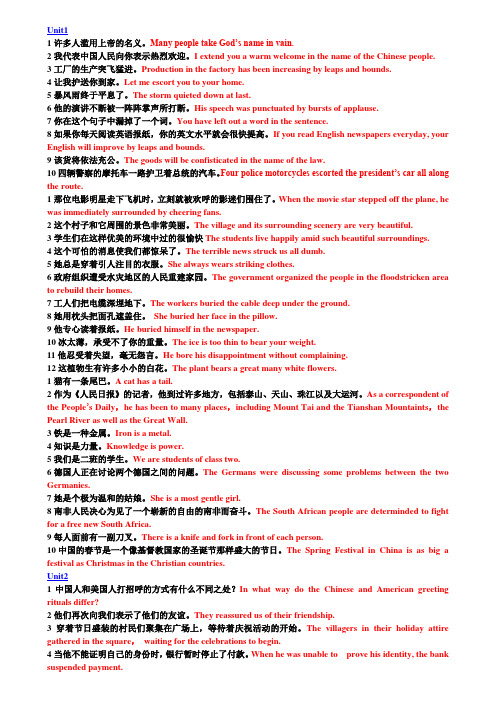
Unit11许多人滥用上帝的名义。
Many people take God’s name in vain.2我代表中国人民向你表示热烈欢迎。
I extend you a warm welcome in the name of the Chinese people.3工厂的生产突飞猛进。
Production in the factory has been increasing by leaps and bounds.4让我护送你到家。
Let me escort you to your home.5暴风雨终于平息了。
The storm quieted down at last.6他的演讲不断被一阵阵掌声所打断。
His speech was punctuated by bursts of applause.7你在这个句子中漏掉了一个词。
You have left out a word in the sentence.8如果你每天阅读英语报纸,你的英文水平就会很快提高。
If you read English newspapers everyday, your English will improve by leaps and bounds.9该货将依法充公。
The goods will be confisticated in the name of the law.10四辆警察的摩托车一路护卫着总统的汽车。
Four police motorcycles escorted the president’s car all along the route.1那位电影明星走下飞机时,立刻就被欢呼的影迷们围住了。
When the movie star stepped off the plane, he was immediately surrounded by cheering fans.2这个村子和它周围的景色非常美丽。
高级英语第二册_lesson_5_Love_is_a_fallacy_para_31-52教学内容

Canny : ['kæ ni]
(adj.) showing self-interest and shrewdness in dealing with others 精明的,谨慎的;节约的
E.g.
But only until canny web users figured out the way to
Para.50 I sat down in a chair and pretended to read a book, but out
of the corner of my eye I kept watching Petey. He was a torn man. First he looked at the coat with the expression of waif [weɪf] at a bakery window.
Para.43-Para.45 "Would you like it?" I asked. “你喜欢吗?”我问道。
"Oh yes!" he cried, clutching the greasy ['grisi] pelt [pɛlt] to him. Then a canny ['kæ ni] look came into his eyes. "What do you want for it?"
Para.50 Back and forth his head swiveled ['swɪvl] , desire waxing
['wæ ksɪŋ] , resolution waning ['weɪnɪŋ] . Finally he didn't turn away at all; he just stood and stared with mad lust [lʌst] at the coat.
高中英语高一下Unit 5 Music的教学设计

高中英语高一下Unit 5 Music的教学设计钟山高级中学英语组邓萍一设计思路英语教学是一种活动教学,教学过程是交际活动过程。
只有从组织教学活动入手,大量地进行语言实践,使英语课堂交际化,才能有效地培养学生运用英语进行交际的能力。
新课标对英语教学提出的要求是用英语进行恰当交流的能力,用英语获取信息和处理信息的能力,用英语进行思维的能力,即:发展听、说、读、写的基本技能,提高初步运用英语进行交际的能力,结合本班学生的实际,对教材进行了一定的处理。
二教学分析教材分析:本单元主题为一位著名的指挥家托斯卡尼尼的人物介绍。
课文中主要对于托斯卡尼尼的生平、在专业方面的天赋与对于指挥事业的全情投入和高度要求、以及他的一些政治观点进行了介绍。
本文为阅读的第一课时,学生们通过学习,不仅能了解一些关于这位杰出指挥家的生平,还可以学会一些有关音乐方面的专业术语和表达方式。
同时,通过学习托斯卡尼尼对待工作严谨的态度,教育学生对于学习也应持有相同的态度,要从这位名人的身上学到一些优良品质,只有这样才能成功。
学情分析:在高一上英语学习的基础上,高一下学生已经掌握了略读、跳读等一定的阅读技巧以及识别关键词、确定主题句等阅读技能,形成了初步的阅读策略。
但大部分学生的基础知识仍然较为薄弱,运用英语进行交际活动的能力较差;主动学习的动力不够,然而学生们对这篇有关音乐的文章会感兴趣些,因此,我在教学设计时,我有意识地帮助学生运用这些技能进行文本的理解,并鼓励学生多开口说。
教学重点:1. 对全文大意作整体理解。
2.掌握本课的重点单词与词组conduct 指挥 ban 禁令composition 作曲call in 临时找来at very short notice 仓促间passionate 热情的interpretation 演绎recall 回忆loyalty n. 忠诚tear…to pieces撕成碎片at a loss不知所措make (good/ the best) use of (好好地,尽量地)利用教学难点:1. 如何利用略读、跳读读等阅读技巧和识别关键词、确定主题句等阅读技能2. 如何促进学生自主学习,尤其是预习。
高一英语下学期unit 5教案
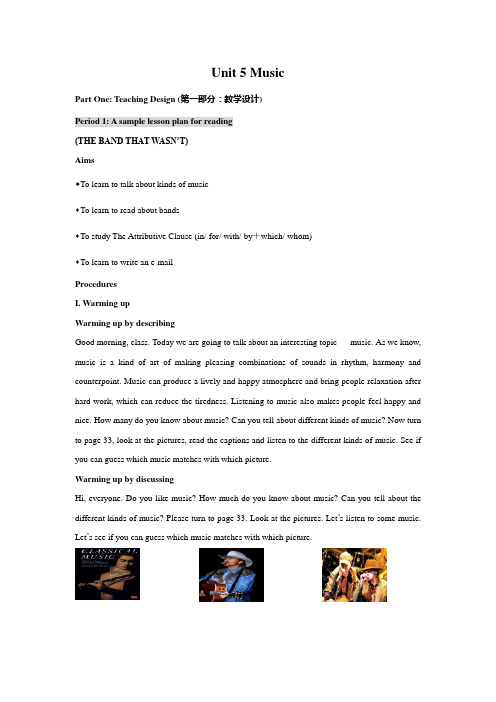
Unit 5 MusicPart One: Teaching Design (第一部分:教学设计)Period 1: A sample lesson plan for reading(THE BAND THAT W ASN’T)Aims◆To learn to talk about kinds of music◆To learn to read about bands◆To study The Attributive Clause (in/ for/ with/ by+which/ whom)◆To learn to write an e-mailProceduresI. Warming upWarming up by describingGood morning, class. Today we are going to talk about an interesting topic --- music. As we know, music is a kind of art of making pleasing combinations of sounds in rhythm, harmony and counterpoint. Music can produce a lively and happy atmosphere and bring people relaxation after hard work, which can reduce the tiredness. Listening to music also makes people feel happy and nice. How many do you know about music? Can you tell about different kinds of music? Now turn to page 33, look at the pictures, read the captions and listen to the different kinds of music. See if you can guess which music matches with which picture.Warming up by discussingHi, everyone. Do you like music? How much do you know about music? Can you tell about the different kinds of music? Please turn to page 33. Look at the pictures. Let‟s listen to some music. Let‟s see if you can guess which music matches with which picture.Classical music Country music Rock ‘n’ RollRap Orchestra Folk musicYes, you are right. I‟m sure you will really enjoy yourselves after listening to all these beautiful music. What kind of music do you like better, Chinese or Western, classical or modern? Why? How does music make you feel? Why do you like to listen to music? Let‟s discuss these questions in small groups. Try to share your opinions with one another.II. Pre-reading1.Thinking and sayingHave you heard about any of the famous bands in the world? List some if you can.2.Listening, talking and sharingLet‟s listen to some pieces of music from different bands. Work in groups of four. Tell your group mates which band you like best. Why? Then the group leader is to stand up and share the group idea with the class.Do you know anything about “The Monkees”?III. Reading1.Reading aloud to the recordingNow please listen and read aloud to the recording of the text T HE BAND THAT WASN‟T. Pay attention to the pronunciation of each word and the pauses within each sentence. I will play the tape twice and you shall read aloud twice, too.2.Reading and underliningNext you are to read and underline all the useful expressions or collocations in the passage. Copy them to your notebook after class as homework.3.Reading to identify the topic sentence of each paragraphSkim the text and identify the topic sentence of each paragraph. You may find it either at the beginning, the middle or the end of the paragraph.3.Reading and transferring informationRead the text again to complete the tables, which list how people formed a band and how The Monkees was formed by the TV organizers and became a real band.How do people get to form a band?How was The Monkees formed and became a real band?The Monkees in 1968 (left to right): Micky Dolenz, PeterTork, Mike Nesmith & Davy Jones4. Reading and understanding difficult sentencesAs you have read the text times, you can surely tell which sentences are difficult to understand. Now put your questions concerning the difficult points to me.IV. Closing downClosing down by doing exercisesTo end the lesson you are to do the comprehending exercises No. 1, 2, 3 and 4.Closing down by having a discussionDo you think the TV organizers were right to call “The Monkees” a band when they did not singor write their own songs? Why?Do you agree that the jokes were more important than the music for this band? Give a reason.Closing down by retelling the form of the band The Monkees.I shall write some key words and expressions on the board. You are to retell the form of the band according to these words.Period 2: A sample lesson plan for Learning about Language(The Attributive Clause (in/ for/ with/ by+which/ whom).AimsTo help students learn about the Attributive Clause with a preposition in front.To help students discover and learn to use some useful words and expressions.To help students discover and learn to use some useful structures.ProceduresI. Warming upWarming up by discovering useful words and expressionsTurn to page 35 and do exercises No. 1, 2 and 3 first. Check your answers against your classmates‟.II. Learning about grammar1.Reading and thinkingTurn to page 34 and read with me th e text of THE BAND THAT W ASN‟t. As you read on, pay attention to The Attributive Clause (in/ for/ with/ by+which/ whom), that is, the attributive clauses with a preposition ahead of the relative pronoun shown in the sentences.2.Doing exercises No. 1 and 2 on page 35Turn to page 34. Look at the two sentences:The musicians of whom the band was formed played jokes on each other as well as played music. However, after a year or so in which they became more serious about their work, “The Monkees”started to play their own instruments and write their own songs like a real band.Pay attention to the structure: preposition + relative pronoun. Usually only two relative pronouns --- which and whom--- can be used in the Attributive Clause, with a preposition put before the clause. That can‟t be used. Look at the screen. Here are more examples on this kind of structure.Now go on to do Exercise No. 2 on page 36, that is, to sort out the sentences.III. Ready used materials for The Attributive Clause (in/ for/ with/ by+which/ whom)In formal styles we often put a preposition before the relative pronouns which and whom:∙The rate at which a material heats up depends on its chemical composition.∙In the novel by Peters, on which the film is based, the main character is a teenager.∙An actor with whom Gelson had previously worked contacted him about the role.∙Her many friends, among whom I like to be considered, gave her encouragement.Notice that after a preposition you can‟t use who in place of whom, and you can‟t use that or zero relative pronoun either:∙Is it right that politicians should make important decisions without consulting the public to whom they are accountable? (not --- the public to who they are accountable.)∙The valley in which the town lies is heavily polluted. (not --- The valley in that the town...)∙Arnold tried to gauge the speed at which they were traveling. (not --- the speed at they were traveling.)In informal English we usually put the preposition at the end in attributive clauses rather than at the beginning:∙The office which Graham led the way to was filled with books.∙Jim‟s footballing ability, which he was noted for, had been encouraged by his parents.∙The playground wasn‟t used by those children who it was built for.In this case we prefer who rather than whom(although whom is used in formal contexts). In restrictive attributive clauses we can also use that or zero relative pronoun instead of who or which (e.g. ...the children (that) it was built for).If the verb in attributive clauses is a two-or-three-word verb (e.g. come across, fill in, go through, look after, look up to, put up with, take on) we don‟t usually put the preposition at the beginning:∙Your essay is one of those (which/that) I‟ll go through tomorrow. (rather than...through which I‟ll go tomorrow.)∙She is one of the few people (who/that) I look up to. (not ... to whom I look up.)In formal written English, we often prefer to use of which rather than whose to talk about things: ∙A huge amount of oil was spilled, the effects of which are still being felt. (or...whose effects are still being felt.)∙The end of the war, the anniversary of which is on the 16th of November, will be commemorated in cities throughout the country. (or...whose anniversary is on...)Note that we can‟t use of which in place of whose in the patterns described in Unit 71B:∙Dorothy was able to switch between German, Polish and Russian, all of which she spoke fluently. (not..,all whose she spoke...)We can sometimes use that...of in place of of which. This is less formal than of which and whose, and is mainly used in spoken English:∙The school that she is head of is closing down. (or The school of which she is head...)Whose can come after a preposition in attributive clauses. However, it is more natural to put the preposition at the end in less formal contexts and in spoken English:∙We were grateful to Mr. Marks, in whose car we had traveled home. (or...whose car we had traveled home in.)I now turn to Freud, from whose work the following quotation is taken. (or...whose work the following quotation is taken from.)IV. Closing down by doing exercises:Join the sentence halves using which or whom after an appropriate preposition. (A)a.I would never have finished the work.b.It was primarily written.c.We know nothing.d.They got a good view.e.He learned how to play chess.f.Dennis scored three goals in the final.g.She was born.h.It was discovered.1.They climbed up to the top of a large rock.2. I would like to thank my tutor.3. She has now moved back to the house on Long Island.4. The star is to be named after Patrick Jenks.S. This is the ball.6. He is now able to beat his father.7. The book is enjoyed by adults as well as children.8. There are still many things in our solar system.Are these correct or appropriate? If they are, put a√. If they are not, give a reason, correct them and give alternatives if you can. (A)I. It's a piece of jewelry across which I came in an antique shop. --- which I came across in an antique shop. (‘came across’ is a two-word verb.)2. The extra work which she took on was starting to affect her health.3. My mother, after whom I looked for over 20 years, died last year.4. The people whom I work with are all very friendly.5. Some of the criticisms with which they had to put up were very unfair.6. He had many friends with whom he had a regular correspondence.7. The woman to who he is engaged comes from Poland.8. The forms which I had to fill in were very complicated.Rewrite these sentences so that they are more appropriate for formal written English. Use preposition + which or preposition + whose, as appropriate. (B)I. Tom Sims, whose car the weapons were found in, has been arrested. Torn Sims, in whose car the weapons were found, has been arrested.2. Tom Ham, whose novel the TV series is based on, will appear in the first episode.3. Dr Jackson owns the castle whose grounds the main road passes through.4. Tessa Parsons is now managing director of Simons, the company that she was once a secretary in.5. Allowing the weapons to be sold is an action that the Government should be ashamed of.6. The dragonfly is an insect that we know very little of.Period 3: A sample lesson plan for Using LanguageAimsTo read the story about Freddy and then enjoy and understand Beatles‟ songs.To use the language by reading, listening, speaking and writing.ProceduresI. Warming up by listening and writingTurn to page 37 and read these sentences before listening to the tape. Then listen to the tape and decide true or false.II. Guided reading1.Reading and translatingRead more about Freddy‟s life and translate it into Chinese paragraph by paragraph.2.Reading and underliningNext you are to read and underline all the useful expressions or collocations in the passage. Copy them to your notebook after class as homework.3.Doing exercisesNow you are going to do exercises No. 3, 4 and 5 on page 38 following the article.Ex3: Here are the incorrect sentences which should be crossed out.1.Freddy and his band always loved being pop stars.2.His favorite program was “Top of the Pops”.3.Things went wrong because Freddy and his band hid themselves.4.They realized they had to go because they were painful.Exercise 4 Answer these questions:1.This is an open question by which students are asked about their opinions.Answers may vary.2.Answers may vary but there is information in the reading passage that may include:--- becoming rich;--- doing a job you want to do;--- having many fans;--- people enjoying your music.3.Answers may vary but information may include:--- peaceful and quiet;--- a private life away from crowds;--- a personal life which others do not discuss.Exercise 5: The main idea is No. 3. This is a story about a band that became famous and did not like it. Only No. 3 best summarizes the main idea, while all the others reflect just part of the main idea. At first, Freddy and his band wanted to be famous, but when he became famous, they were always being followed wherever they went, which they found painful.III. Guided writing1.Writing a letter for advicePlease turn to page 38 writing. Let‟s read the instructions.You‟d better do some brainstorming in small groups before writing your letters. You should follow the procedure for brainstorming and outlining introduced in Module 1 Unit 2.2.Reading Freddy’s replyLet‟s read Freddy‟s reply and answer the questions:--- How was Freddy‟s band formed?--- What advice does Freddy give?3.Writing a note and a paragraphPlease turn to page 74. Now in pairs you are going to decide on the best way to tell a foreign friend about one kind of Chinese folk music. What do you think they need to know before they can enjoy it? Why do you like it? Who are your favorite singers? Discuss it with your partner andwrite notes to remind you of your most important ideas. Then write a paragraph telling your foreign friend about the type of Chinese folk music you have chosen. Use a dictionary and other reference books to help you.IV. Further applyingFinding informationGo to the library to read or get online to search in order to find more information on music and musicians. Take notes of your findings and report them to your group mates next Monday morning.V. Closing down by filling a formMake use of the text and others to fill in the form below.Closing down by describing a bandTo end this period, I am going to have two of you to describe to the class a band whom you appreciates. Who‟d like to speak first?Part Two: Teaching Resources (第二部分:教学资源)Section 1: A text structure analysis of THE BAND THAT WASN’TI. Type of writing and summary of the ideaII. A tree diagramIII. A retold passage of the text1. A possible version:Being a famous singer or musician may be the dream of many people. Becoming a member of a band may help you realize the dream. But just how can people form a band?Most musicians often meet and form a band for they are congenial with each other. High school students may also form a band to practice music together or sometimes play in the street to passers-by to earn some extra money, which is also a chance to realize their dreams of becoming famous.However, There was a band which was started in quite a different way. The musicians of whom the band was formed played jokes on each other and played music, loosely based on the Beatles. Their exciting performances were copied by other groups and were fiercely supported by their fans. That band was The Monkees. After a year or so, The Monkees became more serious of their work, playing their own instruments and writing their own music. Though it broke up in 1970, it reunited in the mid-1980s and is still popular today.Section 2: Background information on music, musicians and the band The MonkeesI. Different types of music:Folk musicIt has been passed down from one generation to another. At first it was never written down. People learned the songs from their families, relatives, neighbors and friends in the same village. These songs were about the country life, the seasons, animals and plants, and about love and sadness in people‟s lives.Pop musicIt is a kind of modern music with a strong beat and not of lasting interest, especially just favored for a short time by younger people•Rock ’n’ RollIt is also called rock and roll, a kind of modern music with strong beat, played loudly on electrical instruments, in which the singer repeats the same few simple words.JazzJazz was born in the USA around 1890. It came from work songs sung by black people and had its roots in Africa. Jazz started developing in the 1920s in the southern states. Soon it was played by white musicians, too, and reached other parts of the USA.African musicIt pla ys an important part in people‟s lives, especially for work, and at festivals and weddings, when people dance all night long.Indian musicIt‟s not written down. There is a basic pattern of notes which the musician follows. But a lot of modern music is also written. India also produces films with music, and millions of records are sold every year.Music in the CaribbeanThe slaves who were brought from Africa developed their own kind of music. West Indians make musical instruments out of large oil cans. They hit different parts of the drum with hammers to produce different notes. This type of music has become very famous in Britain and is very good music to dance to.II. Famous musicians:Joseph Haydn(1732-1809)was an Austrian composer and is known as “the father of the symphony”. Other composers had written symphonies before Haydn, but he changed the symphony into a long piece for a large orchestra.He was born in a village in Austria, the son of a peasant. He had a beautiful singing voice. After studying music in Vienna, Haydn went to work at the court of a prince in eastern Austria, where he became director of music. Having worked there for 30 years, Haydn moved to London, where he was very successful.Wolfgang Amadeus Mozart (1756-1791)was a composer, possibly the greatest musical genius of all time. He only lived 35 years and he composed more than 600 pieces of music.Mozart was born in Salzburg, Austria. His father Leopold was a musician and orchestra conductor. Wolfgang had musical talent from a very early age. He learned to play the harpsichord in a concert for the Empress of Austria.By the time he was 14, Mozart had composed many pieces for the harpsichord, piano and violin, as well as for orchestras. While he was still a teenager, Mozart was already a big star and toured Europe giving concerts. Haydn met Mozart in 1781 and was very impressed with him. “He is the greatest composer the world has known,” he said. The two were friends until Mozart‟s death in 1791.Ludwig van Beethoven (1770-1827)was born in Bonn, Germany. He showed musical talent when he was very young, and learned to play the violin and piano from his father, who was a singer. Mozart met Beethoven and was impressed by him. “He will give something wonderful to the world,” he said. Beeth oven met Haydn in 1791, but was not impressed by the older man. After they had known each other for many years, Beethoven said, “He is a good composer, but he has taught me nothing.” However, it was Haydn who encouraged Beethoven to move to Vienna. Beethoven became very popular in the Austrian capital and stayed there for the rest of his life. Ashe grew older, he began to go deaf. He became completely deaf during the last years of his life, but he continued composing.III. Musical instrument 乐器saxophone electrical equipment pianoguitar fluteV. What are the functions of music?•Make things more lively and interesting•Make things better for people to understan d and enjoy•Express people‟s feeling•Make people feel good•Help people forget their pain•Attract people‟s attention•help people to remember things wellVI. The introduction of the band The MonkeesThe Monkees were a four-person band who appeared in an American television series of the same name, which ran on NBC from 1966 to 1968. The Monkees were formed in 1965 in Los Angeles, California and disbanded in 1970. At their peak they were one of the most popular musical acts of their time.Several reunions of the original lineup have taken place. The first reunion lasted from 1986 to 1989, and a second regrouping took place between 1996-1997. The Monkees last worked together for a brief period in 2001.Section 3: Words and expressions from Unit 5 THE BAND THAT W ASN’TI. Words for Readingclassicaladj.(of music)put together and arranged(composed) with serious artistic intentions; having an attraction that lasts over a long period of time(as opposed to popular or folk music)(音乐)古典的Bach and Beethoven wrote classical music. the classical music of India/ the classical symphonyrollvt.&vi.1. to (cause to) move along by turning over and over(使)滚动We rolled the barrels of oil onto the ship. Tears were rolling down her cheeks. 2. to move steadily and smoothly along(as) on wheels(车轮)滚动;转动The train rolled slowly into the station. The waves rolled over the sand. 3. (of a ship)to swing from side to side with the movement of the waves摇摆;摇晃The ship rolled so heavily that we were all sick.4. keep the ball rolling: to keep things active and moving(使事情,工作等)继续进行下去;不松懈5.set the ball rolling: to be the first to do something, hoping that others will follow带动;带头(希望他人跟随)I‟ll sing a song first, just to set the ball rolling. folkadj. of, connected with, or being music or any other art that has grown up among working and/or country people as an important part of their way of living and belongs to a particular area, trade, etc., or that has been made in modern times as a copy of this(音乐;艺术)民间的;民俗的folk music/ folk songs/ Chinese folk art/ give a folk concert/a folk singerjazz n.爵士音乐traditional jazz/ modern jazz/ jazz music/ a jazz bandmusician n.音乐家a fine musiciandreamn. 1. a group of thoughts, images, or feelings experienced during sleep梦2. sth. imaged, not real, but believed in or greatly and hopefully desired理想;梦想v.梦见;梦想dream of/about (doing) sth./ dream a dreamclapvi.鼓掌Clap one‟s hand in time to the music/ clap sb. on sth./ clap sb. on the back/clap eyes on sb.be honest with = be frank with/ to tell you the truthformvt.&n.(使)组成;形成form some ideas or opinion about sth./ form a nation/ form a line/ form goodhabits/ in the form of/ in form/ fill in the form/ take the form ofpasser-by n. 过路人;行人passers-by/ ask the passer-byearnvt. 1. to get (money) by working赚;挣(钱)He earns $10000 a year(by writing stories).2.to get(sth. that one deserves)because of one‟s qualities博得;赢得He earned the title of “The Great” by his victories in the war. earn money/ earn one‟s living / earn sb. successloosely adv.宽松的;松散的loosely speaking/ loosely translatedadvertisementn. also ad--a notice of sth. for sale, service offered, job position to be filled, room to let, etc., as in a newspaper, painted on a wall, or made as a film广告the advertisement page/ advertisement for sb./sth./ put an advertisementactor n. 男演员;行动者actor and actress/ an excellent actorattractiveadj.having the power to attract有吸引力的The idea is very attractive. sound attractive/ at attractive pricefann. 1.扇子turn the fan on 2.a very keen follower or supporter, as of a sport, performing art, or famous person迷;狂热者fan clubinstrumentn.工具;器械;乐器play an instrument/ the instruments of the orchestra/ a ship‟s instruments II. Words for Learning about Languagehitn.(演出等)成功;打击a direct hit on an enemy ship/ a final score of two hits and six misses/ a hit with everyone/ His film is quite a hit/ They sang their latest hit./ make a hitsortn.& vt.种类;类别;分类;整理the sort of person I really dislike/ What sort of paint are you using?/ sort sth. out (into) sth./ sort through sth.III. Words for Using Languageafterwardsadv. later; after that以后;后来Let‟s go to the theatre first and eat afterwards.performvt.& vi. 1. to do; carry out(a piece of work)实行;做The doctor performed the operation. 2. to fulfill (a promise, order, etc.) 履行;执行(允诺,命令)3. to give, act or show(a play, a part(role)in a play, a piece of music, tricks, etc.) esp. before the public表演perform a task/ perform one‟s duty/ perform an operation to save one‟s life/ perform the piano/perform skillfully on the flute/ perform live on television/ perform a ceremonyperformancen.表演;履行faithful in the performance of one‟s duty/ the evening performance/give a performance of “Hamlet”/ in performancestickvi 1. to (cause to) be fixed with a sticky substance粘贴;张贴Stick a piece of paper over the old address and write the new one on it.stick to one‟s fingers/ stick a stamp on a letter 2. stick to: to refuse to leave or change/stick up a note on the note-board/ stick the pen behind the ear坚持;固守stick to one‟s plan/to stick to one‟s promiseabilityn. power and skill, esp. to do, think, act, make, etc.(尤指工作, 思考,行动,创造等)能力a machine with the ability to copy with large loads/ have the ability to do the work/ a woman of great ability/ have a great musical abilitysayingn.话;俗话…More haste, less speed,‟ as the saying goes.reputationn. (an) opinion held by others(about someone or sth.); the degree to which one is well thought of 名誉;名声: a school with an excellent reputation/ a good reputation as a doctor/ have a reputation for laziness/ ruin sb.‟s reputation/ make a reputation for oneself/ live up to one‟s reputation unknownadj.& n. 不知道的;未知的人或物unknown forces/ an unknown actor/ unknown to sb./ a journey into the unknown。
自考高级英语下册lesson5
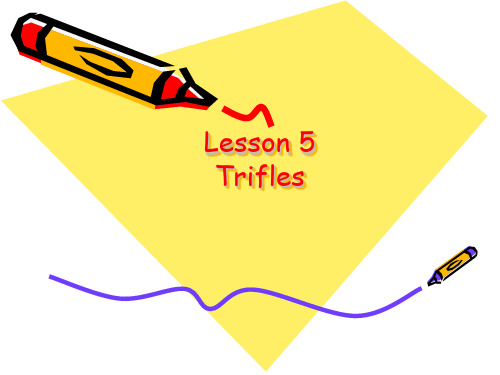
bundled up…
1)dress sb. in warm clothes • It„s pretty cold outside. You‟d better bundle up well.外面很冷,你最好穿暧和点。 2)make into a bundle or bundles 捆扎 • We bundled everything up.我们把每件东西 都捆扎起來了
pleat 把……打褶,把……编成辫;编织 pleat n./v. a shirt with pleats in the front pleated curtains Her hair was pleated in a queue. • 她的头发编成 up. do up有多种含义与用法,如“收拾,打扮,捆扎 等”,这里则表示“累坏了,非常疲倦”的意 思。E.g. They did up the house before the tenants moved in.房客搬近来前,他们收 拾了房子。 She did herself up for the party.她打扮得漂 漂亮亮地去参加晚会。 Please do up the parcel and post it.请捆扎好 包裹,然后邮寄出去。 He was quite done up after the long journey. 长途旅行之后,他非常疲倦。
• •
• And yet, for all their worries, what would we do without the ladies? 句子 中for all的意思是“尽管”虽然。 • E.g. For all his wealth, he was unhappy.尽管他有万贯家产,但他并不 幸福。 • He is a poor musician for all his training.尽管接受了训练,他还是个蹩 脚的音乐家。
- 1、下载文档前请自行甄别文档内容的完整性,平台不提供额外的编辑、内容补充、找答案等附加服务。
- 2、"仅部分预览"的文档,不可在线预览部分如存在完整性等问题,可反馈申请退款(可完整预览的文档不适用该条件!)。
- 3、如文档侵犯您的权益,请联系客服反馈,我们会尽快为您处理(人工客服工作时间:9:00-18:30)。
Teaching procedures
I. Pre-reading Questions II. Background Information III. Structure of the Text Iv. Questions For Discussion V. Follow-up Questions
7.How did Petey respond when he knew that the narrator wanted to exchange it with his girl? 8.From the description in para. 50 , do you think he would be able to fight against the temptation? 9.What does the writer mean when he said “He was a torn man” , “with the expression of a waif at the bakery window” and “set his jaw resolutely”? 10.Explain the structure ‘desire waxing, resolution waning’. What figure of speech is this ? 11.How does Petey look like in the raccoon coat? 12.How did the two young men treat love and the Polly?
Questions for Discussion
Questions for Group 1 ( Paras. 1—5) 1.Why did the writer mention Charles Lamb? 2.What can you infer about his (Lamb’s) writing style? 3.Explain the figurative meaning of “ unfettered”. 4.What is compared to “ a frontier”? 5.The writer thinks ‘ limp, flaccid, spongy ’ are the appropriate words to describe the following essay, what does he indicate? 6.What’s the writer’s purpose of writing this essay? Do you agree with him? 7.Identify the figures of speech in para. 3 and explain them in plain, non-figurative language.
• The title of the story “Love is a fallacy” has two meanings . When “fallacy” is taken in its ordinary sense, the title means “ there is a deceptive or delusive quality about love”, or love is not one hundred percent true or pure. When taken as a specific term in logic, the title means “ love can nቤተ መጻሕፍቲ ባይዱt be deduced from a set of given premises” or love is illogical.
Fallacy means: 1) an idea or belief that is false but that many people think it is true because it is based on incorrect information or faulty reasoning.谬论, 谬见e.g. That the world is flat was at one time a popular fallacy. The belief that women are always weaker than men is just a fallacy. 2) (formal) a mistake or weakness and lack of logic or good sense in an argument or piece of arguing. 逻 辑上的推理谬误e.g. That is a statement based on fallacy.
8.The young man began to heap on himself all the beautiful words of praise he can think of, what conclusion can we draw about this young man? 9.What are the three different things he compared his brain to? Why does he do so? 10.In this para., what does he call himself? 11.How does the narrator describe his roommate Petey Burch to downgrade him? 12.What’s the meaning of the slang ‘ nothing upstairs’? 13.What’s the narrator’s attitude toward ‘fad’ or ‘faddist’?
10. According to the narrator, why did he choose Polly to be his girl? 11.Identify and explain the figures in para. 23. 12.What quality was missing in Polly? Or what was Polly lack of? 13.How do you understand ‘ pin-up proportions’? 14.What impression do you get about the girl? Notice the three noun phrases the writer uses to describe her. 15.Identify the euphemism and antithesis used in para. 27 and then explain them. 16.What does the narrator plan to do with her / Is it very philosophical?
The Structure of the Text
Part 1 : (Paras.1—3) The author's note--- preparations for his essay. Part2 : (Paras. 4—5) Narrator’s boasting of himself and downgrading of his roommates. Part 3: (Paras. 6—59) Narrator’s deal with Petey Burch. Part 4 : (Paras 60—154) Narrator’s dates with Polly.
Unit 5 Love is a fallacy
Learning objectives
Get to know more about Max Shulman and his story “ The Many Loves of Dobie Gillis” Have a good command of the special writing style of this story Have a better understanding of “ love”
“Love is kind and patient, never jealous, boastful, proud, or rude. Love is not selfish or quick-tempered. It does not keep a record of wrongs that others do. Love rejoices in the truth, but not in evil. Love is always supportive, loyal, hopeful, and trusting. Love never fails!” from Corinthians 1, New Testament 歌林多前书》 《歌林多前书》
Pre-reading Questions
1. 2. 3.
4. 5.
How do you define “LOVE”? Is schoolyard love faddish ( fashionable) now? What is your criteria of choosing husbands and wives? How do you define the word “ fallacy”? Do you think “ Love is a fallacy”? How do you explain it?
Questions for Group 2 (Paras. 6—27) 1.What was the problem to Petey one afternoon while lying on his bed? 2.Explain ‘pausing in my flight’. 3.What is ‘ Charleston’? 4.What does he imply by saying ‘Where have you been’? 5.Do you think the narrator really take Petey’s words literally? 6.Explain ‘Big Men on Campus’. 7.What did he say about the raccoon coat? 8.What’s the meaning of ‘ in the swim’? 9.There is a mixed metaphor in para.20 identify it and explain it.
